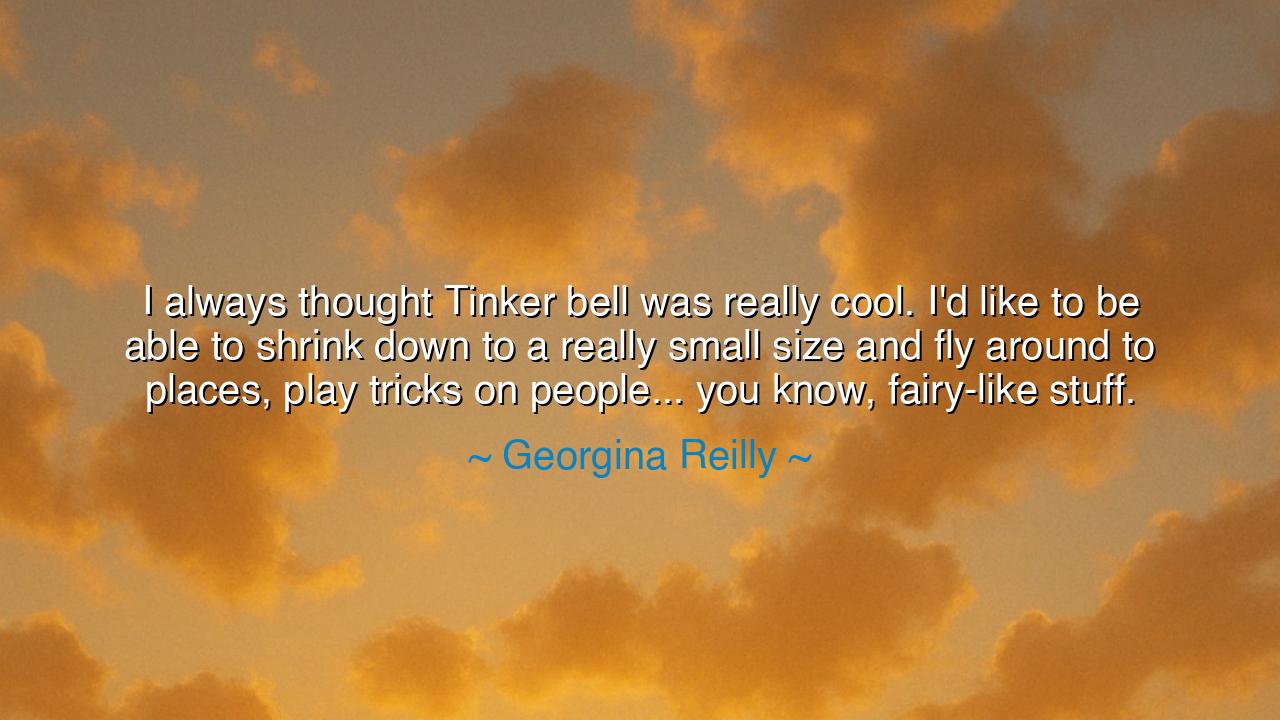
I always thought Tinker bell was really cool. I'd like to be able
I always thought Tinker bell was really cool. I'd like to be able to shrink down to a really small size and fly around to places, play tricks on people... you know, fairy-like stuff.






"I always thought Tinker Bell was really cool. I'd like to be able to shrink down to a really small size and fly around to places, play tricks on people... you know, fairy-like stuff," says Georgina Reilly, and in these words, we are reminded of the deep, ancient yearning to transcend the ordinary and enter into a realm of magic and wonder. Tinker Bell, that emblem of mischief and freedom, is not merely a character from a children’s story but a symbol of a deeper truth—the desire to explore beyond the limits of our physical selves, to experience the world in ways that stir the imagination and ignite the spirit. This longing to be small yet capable of greatness speaks to something far older than the modern world; it is an expression of the human desire to break free from the mundane and into a realm where anything is possible.
In the ancient mythologies of Greece and Rome, there were countless tales of spirits and gods who took on small, subtle forms to interact with the human world. Puck, the mischievous fairy from Shakespeare’s A Midsummer Night’s Dream, was a creature of tricks and play, moving in and out of the shadows, bending reality with a wink. Similarly, Hermes, the Greek god of travelers and thieves, was known for his ability to slip through spaces unnoticed, a master of both speed and deception. These figures were not bound by the laws of the material world; they were embodiments of freedom, able to shrink, expand, and traverse the boundaries between realms. Tinker Bell, in her own way, carries this ancient spirit—an agent of mischief, yet also one of joy and lightness.
The desire to shrink and fly, to play tricks on people, is more than mere fantasy; it represents the eternal yearning for the impossible. In the same way that ancient explorers sought out uncharted territories, or philosophers longed to understand the mysteries of existence, the wish to transform oneself into something small and elusive speaks to a deeper desire to experience the world from a completely new perspective. Visionaries, like the great Leonardo da Vinci, dreamed not only of machines and inventions but of ways to move beyond the restrictions of the human form. Da Vinci’s designs for flying machines were not born of practicality alone; they were the manifestations of his boundless curiosity, a desire to escape gravity and soar like a bird.
This idea of playfulness and freedom is not limited to the realm of fantasy. Writers, artists, and innovators throughout history have embodied the same spirit of lightness and joy that Georgina Reilly admires in Tinker Bell. Consider the story of Isaac Newton, whose discovery of the laws of gravity was, in a sense, a recognition of how the world itself could be both constrained and liberated. Yet, Newton himself was often described as a person of great playfulness, with a spirit of curiosity that led him to explore not just the sciences, but the unknown mysteries of life, much like a mischievous fairy exploring the world.
There is a profound lesson in this for us today: to embrace the spirit of adventure and curiosity that Tinker Bell embodies, to move beyond the constraints of everyday life and seek joy in discovery. It is all too easy to become caught up in the seriousness of existence, to forget the freedom that comes with exploring, with creating, and with embracing the unknown. Imagination, as the ancients knew, is not merely a tool for artists and dreamers—it is a necessary force that propels the soul forward, that pushes us beyond the limits of the possible and into the realm of the extraordinary.
In our own lives, we should ask ourselves: What small adventures can we embark on today? How can we embrace the playful and joyful parts of ourselves that have perhaps been buried under the weight of adult responsibilities? Perhaps it is time to dream big, even if the dreams seem impossible. Whether it is in our personal relationships, our careers, or our creative pursuits, there is room for us all to shrink down, metaphorically, to see the world from a different angle, to lighten the burden of seriousness, and to find freedom in the small, in the unseen.
Tinker Bell’s ability to shrink, fly, and play tricks reminds us that we too have the power to redefine our world, to move through life with both wisdom and playfulness. The practical wisdom here is this: do not let the weight of the world keep you from exploring, from playing, and from seeking out the wonder that is all around you. Let the lightness of the spirit guide you in both your work and your play. Like Tinker Bell, embrace the world with a sense of joy, imagination, and above all, freedom—for it is only when we see the world as a playground of infinite possibilities that we truly come alive.






AAdministratorAdministrator
Welcome, honored guests. Please leave a comment, we will respond soon